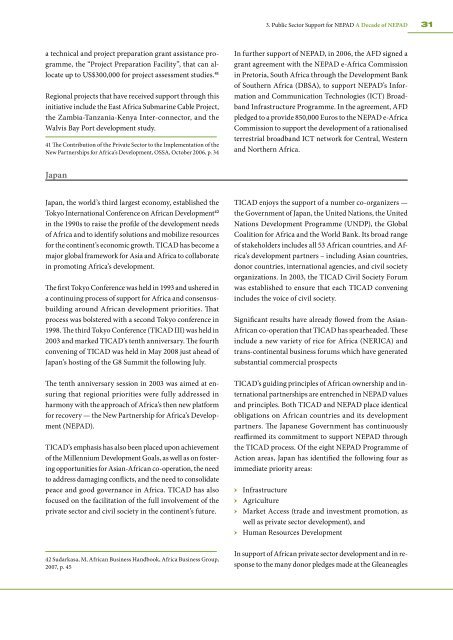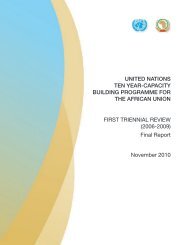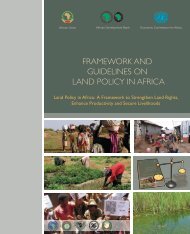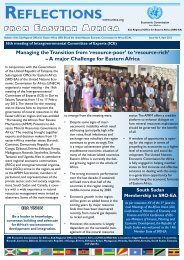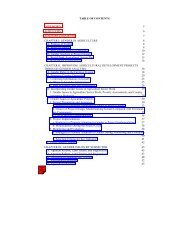A Decade of NEPAD - Economic Commission for Africa - uneca
A Decade of NEPAD - Economic Commission for Africa - uneca
A Decade of NEPAD - Economic Commission for Africa - uneca
Create successful ePaper yourself
Turn your PDF publications into a flip-book with our unique Google optimized e-Paper software.
a technical and project preparation grant assistance programme,<br />
the “Project Preparation Facility”, that can allocate<br />
up to US$300,000 <strong>for</strong> project assessment studies. 41<br />
Regional projects that have received support through this<br />
initiative include the East <strong>Africa</strong> Submarine Cable Project,<br />
the Zambia-Tanzania-Kenya Inter-connector, and the<br />
Walvis Bay Port development study.<br />
41 The Contribution <strong>of</strong> the Private Sector to the Implementation <strong>of</strong> the<br />
New Partnerships <strong>for</strong> <strong>Africa</strong>’s Development, OSSA, October 2006, p. 34<br />
Japan<br />
Japan, the world’s third largest economy, established the<br />
Tokyo International Conference on <strong>Africa</strong>n Development 42<br />
in the 1990s to raise the pr<strong>of</strong>ile <strong>of</strong> the development needs<br />
<strong>of</strong> <strong>Africa</strong> and to identify solutions and mobilize resources<br />
<strong>for</strong> the continent’s economic growth. TICAD has become a<br />
major global framework <strong>for</strong> Asia and <strong>Africa</strong> to collaborate<br />
in promoting <strong>Africa</strong>’s development.<br />
The first Tokyo Conference was held in 1993 and ushered in<br />
a continuing process <strong>of</strong> support <strong>for</strong> <strong>Africa</strong> and consensusbuilding<br />
around <strong>Africa</strong>n development priorities. That<br />
process was bolstered with a second Tokyo conference in<br />
1998. The third Tokyo Conference (TICAD III) was held in<br />
2003 and marked TICAD’s tenth anniversary. The fourth<br />
convening <strong>of</strong> TICAD was held in May 2008 just ahead <strong>of</strong><br />
Japan’s hosting <strong>of</strong> the G8 Summit the following July.<br />
The tenth anniversary session in 2003 was aimed at ensuring<br />
that regional priorities were fully addressed in<br />
harmony with the approach <strong>of</strong> <strong>Africa</strong>’s then new plat<strong>for</strong>m<br />
<strong>for</strong> recovery — the New Partnership <strong>for</strong> <strong>Africa</strong>’s Development<br />
(<strong>NEPAD</strong>).<br />
TICAD’s emphasis has also been placed upon achievement<br />
<strong>of</strong> the Millennium Development Goals, as well as on fostering<br />
opportunities <strong>for</strong> Asian-<strong>Africa</strong>n co-operation, the need<br />
to address damaging conflicts, and the need to consolidate<br />
peace and good governance in <strong>Africa</strong>. TICAD has also<br />
focused on the facilitation <strong>of</strong> the full involvement <strong>of</strong> the<br />
private sector and civil society in the continent’s future.<br />
42 Sudarkasa, M, <strong>Africa</strong>n Business Handbook, <strong>Africa</strong> Business Group,<br />
2007, p. 45<br />
3. Public Sector Support <strong>for</strong> <strong>NEPAD</strong> A <strong>Decade</strong> <strong>of</strong> <strong>NEPAD</strong><br />
In further support <strong>of</strong> <strong>NEPAD</strong>, in 2006, the AFD signed a<br />
grant agreement with the <strong>NEPAD</strong> e-<strong>Africa</strong> <strong>Commission</strong><br />
in Pretoria, South <strong>Africa</strong> through the Development Bank<br />
<strong>of</strong> Southern <strong>Africa</strong> (DBSA), to support <strong>NEPAD</strong>’s In<strong>for</strong>mation<br />
and Communication Technologies (ICT) Broadband<br />
Infrastructure Programme. In the agreement, AFD<br />
pledged to a provide 850,000 Euros to the <strong>NEPAD</strong> e-<strong>Africa</strong><br />
<strong>Commission</strong> to support the development <strong>of</strong> a rationalised<br />
terrestrial broadband ICT network <strong>for</strong> Central, Western<br />
and Northern <strong>Africa</strong>.<br />
TICAD enjoys the support <strong>of</strong> a number co-organizers —<br />
the Government <strong>of</strong> Japan, the United Nations, the United<br />
Nations Development Programme (UNDP), the Global<br />
Coalition <strong>for</strong> <strong>Africa</strong> and the World Bank. Its broad range<br />
<strong>of</strong> stakeholders includes all 53 <strong>Africa</strong>n countries, and <strong>Africa</strong>’s<br />
development partners – including Asian countries,<br />
donor countries, international agencies, and civil society<br />
organizations. In 2003, the TICAD Civil Society Forum<br />
was established to ensure that each TICAD convening<br />
includes the voice <strong>of</strong> civil society.<br />
Significant results have already flowed from the Asian-<br />
<strong>Africa</strong>n co-operation that TICAD has spearheaded. These<br />
include a new variety <strong>of</strong> rice <strong>for</strong> <strong>Africa</strong> (NERICA) and<br />
trans-continental business <strong>for</strong>ums which have generated<br />
substantial commercial prospects<br />
TICAD’s guiding principles <strong>of</strong> <strong>Africa</strong>n ownership and international<br />
partnerships are entrenched in <strong>NEPAD</strong> values<br />
and principles. Both TICAD and <strong>NEPAD</strong> place identical<br />
obligations on <strong>Africa</strong>n countries and its development<br />
partners. The Japanese Government has continuously<br />
reaffirmed its commitment to support <strong>NEPAD</strong> through<br />
the TICAD process. Of the eight <strong>NEPAD</strong> Programme <strong>of</strong><br />
Action areas, Japan has identified the following four as<br />
immediate priority areas:<br />
ӹ Infrastructure<br />
ӹ Agriculture<br />
ӹ Market Access (trade and investment promotion, as<br />
well as private sector development), and<br />
ӹ Human Resources Development<br />
In support <strong>of</strong> <strong>Africa</strong>n private sector development and in response<br />
to the many donor pledges made at the Gleaneagles<br />
31


